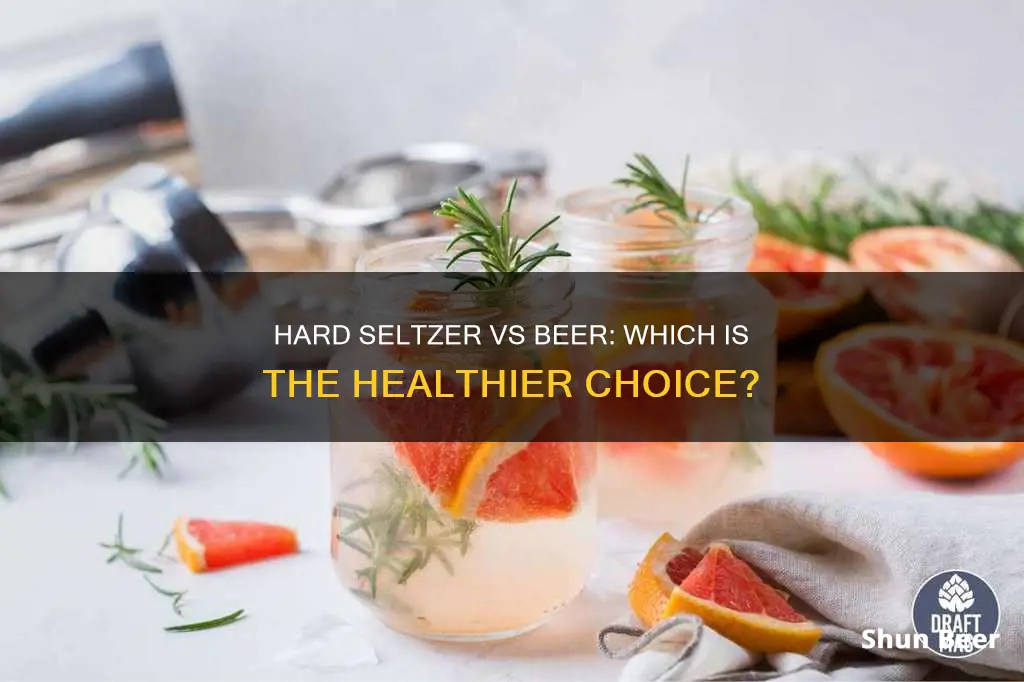
Hard seltzer is often marketed as a healthier alternative to beer, but is it? With its light, refreshing taste and low-calorie count, hard seltzer seems like a better option than beer, which is often seen as heavy and more caloric. Hard seltzers typically have about 100 calories and 2 grams of carbohydrates per 12-ounce can, while a beer of the same size has about 150 calories and 15 to 30 grams of carbohydrates. Hard seltzer is also usually gluten-free, as it's made with fermented cane sugar instead of grains, making it a good choice for those with gluten intolerance or celiac disease.
What You'll Learn

Hard seltzer is lower in calories and carbohydrates than beer
Hard seltzer is often marketed as a healthier alternative to beer, and there is some truth to this claim. Hard seltzer is typically lower in calories and carbohydrates than beer, which makes it a more appealing option for those watching their caloric intake or following a keto or low-carb diet.
A standard 12-ounce can of hard seltzer typically contains about 100 calories and 2 grams of carbohydrates, while a beer of a similar size has about 150 calories and 15 to 30 grams of carbohydrates. This difference in calorie and carb content is because hard seltzers are usually made with fermented cane sugars, while beer is made with fermented grains.
The lower calorie and carb content of hard seltzer can be especially beneficial for individuals with diabetes. The high sugar and carb content of beer and other alcoholic beverages can cause blood sugar spikes, while the low-carb, low-sugar content of hard seltzer makes it a better option for those managing their blood sugar levels.
In addition to being lower in calories and carbs, hard seltzer is also typically gluten-free. Since it is made with fermented cane sugar rather than grains, it is a safe option for those with celiac disease or gluten intolerance. However, it is important to check the label, as some brands may not be 100% gluten-free.
While hard seltzer has some health benefits compared to beer, it is important to remember that it is still an alcoholic beverage. The "health halo" effect of hard seltzer may lead people to believe that it is a healthy drink, but excessive consumption of any alcoholic beverage can have negative health consequences. Hard seltzer's refreshing and light taste can make it easy to drink, and the lower calorie count may encourage people to drink more than they realize. Therefore, it is important to consume hard seltzer in moderation, just like any other alcoholic beverage.
Twisted Tea vs Beer: Which Boozy Beverage is Better?
You may want to see also

Hard seltzer is gluten-free, whereas beer contains gluten
Gluten is a type of protein found in wheat, barley, and rye. It is present in many processed foods like bread, pasta, noodles, and cereals. For people with celiac disease, an autoimmune condition triggered by gluten, consuming gluten causes inflammation in the small intestine. Over time, this inflammation damages the lining of the small intestine, impairing its ability to absorb nutrients.
As hard seltzer is usually made by fermenting cane sugar, it is gluten-free and safe for people with celiac disease to consume. However, it is important to note that not all hard seltzers are gluten-free. Some may use malted barley as their base, which contains gluten. Therefore, it is essential to always check the ingredients label and look for a gluten-free symbol on the packaging.
On the other hand, beer is traditionally made with barley, hops, and sometimes wheat. As barley and wheat contain gluten, beers made from either of these grains are not gluten-free. While there are gluten-free beers made with alternative grains like sorghum, regular beers are not recommended for those on a gluten-free diet.
The distinction between gluten-free and gluten-removed products is also important. Gluten-removed beers are made with grains containing gluten, and while the gluten is removed during production, some fragments may remain. For people with celiac disease, even small amounts of gluten can be harmful. Therefore, it is recommended that those with celiac disease avoid gluten-removed beers and choose gluten-free options instead.
Champagne vs Beer: Which is the Healthier Choice?
You may want to see also

Hard seltzer is less filling than beer, so it's easy to drink more
Hard seltzer is often marketed as a healthier alternative to beer, and it's true that it is usually lower in calories and carbohydrates. However, this doesn't necessarily make it healthier. Hard seltzer is less filling than beer, so it's easy to drink more, and excess consumption of alcohol is linked to many long-term health effects, including high blood sugar, heart disease, stroke, digestive problems, liver disease, and cancer.
Hard seltzer is typically made with fermented cane sugars, whereas beer is made with fermented grains. This difference in production methods means that hard seltzer tends to have a lower alcohol content and is gluten-free, which can be an appealing factor for those with gluten intolerance or celiac disease.
The light and refreshing nature of hard seltzer, with its subtle fruit flavours, makes it easy to drink, especially during the summer. However, it's important to remember that it is still an alcoholic beverage, and the "health halo" effect can lead people to believe that they are making a healthy choice by drinking it in excess.
While hard seltzer may be a good option for those looking for a low-calorie alcoholic drink, it's important to be mindful of the amount consumed. Alcohol is alcohol, regardless of the source, and moderation is key to maintaining a healthy relationship with it.
So, if you're looking to make a healthier choice, be mindful of the "health halo" effect and remember that hard seltzer is less filling than beer, so it's easy to drink more than you intend.
Beer-Battered Fish: Healthy or Harmful?
You may want to see also

Hard seltzer is more hydrating than beer
Hard seltzer is often marketed as a healthier alternative to beer, and while it does have some benefits, it's important to be aware of the whole picture. Hard seltzer typically has fewer calories and less sugar than beer, but it's still an alcoholic drink, and excessive consumption of alcohol is linked to various long-term health effects.
One of the main advantages of hard seltzer over beer is that it's usually gluten-free. Beer is made with fermented grains, while hard seltzer is made with fermented cane sugars, making it a good option for individuals with gluten intolerance or celiac disease.
When it comes to hydration, hard seltzer does have an edge over beer. Hard seltzer is made with sparkling water, and according to a study published in the American Journal of Clinical Nutrition in 2015, seltzer is as hydrating as regular water. However, it's important to remember that hard seltzer contains alcohol, and alcohol is a diuretic, which means it increases urination and can lead to dehydration. So, while the water content in hard seltzer may provide some hydration, the alcohol component can counteract those effects. To maintain proper hydration, it's crucial to drink water along with alcoholic beverages, including hard seltzer.
In conclusion, while hard seltzer may offer certain advantages over beer in terms of gluten content and hydration, it's important to consume it in moderation and stay adequately hydrated by drinking water alongside your alcoholic beverage of choice.
Athletic Beers: Healthy or Just Hype?
You may want to see also

Both hard seltzer and beer have an average alcohol content of 5%
Hard seltzer and beer have comparable alcohol content, with both beverages typically containing around 5% ABV. This similarity in alcohol content is worth noting, as it is a critical factor in determining the health implications of consuming these drinks.
Hard seltzer is often marketed as a healthier alternative to beer and other alcoholic drinks. Its rise in popularity can be attributed to consumers seeking lower-calorie and lower-sugar options. Indeed, hard seltzer typically contains about 100 calories and 2 grams of carbohydrates per 12-ounce can, compared to 150 calories and 15 to 30 grams of carbohydrates in a similar-sized beer. This lower calorie and sugar content can be attributed to the use of fermented cane sugars in hard seltzer, as opposed to the fermented grains used in beer.
However, it is important to be cautious of the "health halo" effect associated with hard seltzer. While it may be lower in calories and sugar, hard seltzer is still an alcoholic beverage, and excessive consumption can lead to adverse health effects. The light and refreshing taste of hard seltzer may make it easier to consume more than intended, potentially leading to health issues such as high blood sugar, heart disease, stroke, digestive problems, liver disease, and cancer.
Beer, on the other hand, tends to be more filling due to its higher calorie and carbohydrate content. Additionally, beer often contains trace minerals and polyphenols, which can provide some health benefits. However, it is important to note that beer usually contains gluten, which may be a concern for individuals with celiac disease or gluten sensitivity.
In summary, while hard seltzer and beer have similar alcohol content, hard seltzer may be a preferable option for those watching their calorie or sugar intake or seeking gluten-free alternatives. However, it is important to consume either beverage in moderation, as excessive alcohol consumption can lead to negative health consequences.
Seltzers vs Beer: Which is the Healthier Choice?
You may want to see also
Frequently asked questions
Hard seltzer is often marketed as a healthier alternative to beer, but it's important to understand the nuances. Hard seltzer typically contains fewer calories and carbohydrates than beer, but that doesn't necessarily make it healthier. Alcohol is alcohol, regardless of the source, and excessive drinking has various long-term health risks.
Hard seltzer usually has around 100 calories and 2 grams of carbohydrates per 12-ounce can, while a similar-sized beer contains about 150 calories and 15 to 30 grams of carbohydrates. Hard seltzer is also generally gluten-free, as it's made with fermented cane sugar rather than grains.
Hard seltzer can be a good option for those watching their caloric intake or looking for a gluten-free alternative. It's also a convenient, refreshing, and low-calorie option for those who want to enjoy an alcoholic beverage. However, it's important to remember that hard seltzer is still an alcoholic drink, and moderation is crucial.







